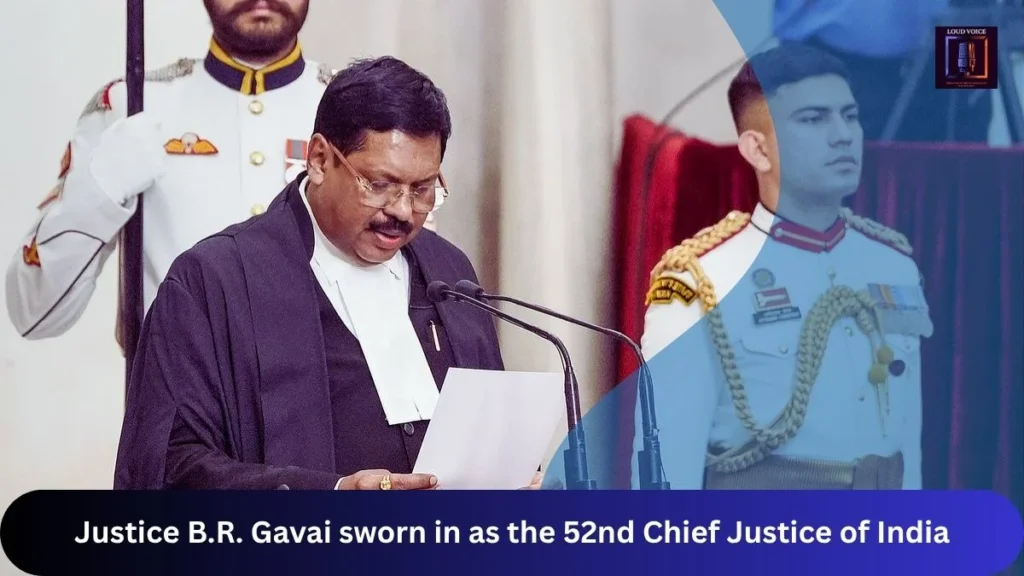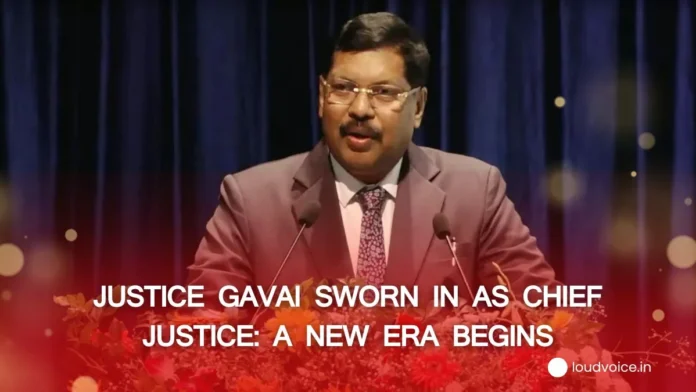Key Takeaways
- Justice Gavai sworn in as Chief Justice of India during a historic ceremony, becoming the first Buddhist to hold the nation’s highest judicial office.
- His tenure runs until November 23, 2025, offering over six months to lead the judiciary through major decisions.
- Gavai has participated in more than 700 Supreme Court benches and delivered close to 300 rulings.
- He played key roles in landmark verdicts such as the Article 370 abrogation and electoral bonds case.
- His appointment marks a significant milestone for diversity and representation in India’s judiciary.
A Momentous Day for India’s Judiciary
On May 14, 2025, at 10:09 AM IST, the Rashtrapati Bhavan in New Delhi became the stage for a historic event as Justice Bhushan Ramkrishna Gavai was sworn in as the 52nd Chief Justice of India (CJI). President Droupadi Murmu administered the oath, marking a significant milestone in India’s judicial history. Justice Gavai’s appointment is groundbreaking: he is the first Buddhist and only the second Scheduled Caste individual to hold this prestigious office, following Justice K.G. Balakrishnan.
This moment resonates far beyond the ceremonial. It symbolizes India’s evolving commitment to a judiciary that mirrors its diverse society. With a career defined by landmark judgments and a deep-rooted belief in equality, Justice Gavai steps into this role at a pivotal time, ready to guide the Supreme Court through complex legal and social challenges.
Who Is Justice B.R. Gavai?
Roots in Social Justice
Born on November 24, 1960, in Amravati, Maharashtra, Justice Gavai hails from a family steeped in public service and social activism. His father, R.S. Gavai, was a towering figure in the Republican Party of India and served as Governor of Bihar, Sikkim, and Kerala. The Gavai family’s embrace of Buddhism, inspired by Dr. B.R. Ambedkar, reflects their dedication to social equality—a value that has shaped Justice Gavai’s worldview. His brother, Rajendra Gavai, continues this legacy in politics, reinforcing the family’s commitment to public welfare.
Building a Legal Foundation
Justice Gavai’s academic journey began at Nagpur University, where he earned a Bachelor of Arts and Bachelor of Laws (B.A.LL.B.). After registering as an advocate on March 16, 1985, he received training from Bar. Raja S. Bhonsale, a former attorney general and Bombay High Court judge. From 1987 to 1990, he practiced independently at the Bombay High Court, later focusing on constitutional and administrative law at the Nagpur Bench. His early work included representing municipal corporations, universities, and autonomous bodies, showcasing his versatility and legal prowess.
A Judicial Career Marked by Impact
The judicial rise of Justice Gavai is evidence of his skill and commitment. His career milestones include:
- Assistant Government Pleader and Additional Public Prosecutor (August 1992–July 1993) at the Nagpur Bench of the Bombay High Court.
- Public Prosecutor and Government Pleader (appointed January 17, 2000) for the Nagpur Bench.
- Additional Judge of the Bombay High Court (November 14, 2003), becoming a permanent Judge on November 12, 2005.
- Supreme Court Judge (May 24, 2019), where he has served with distinction.
Landmark Judgments
Throughout his tenure at the Supreme Court, Justice Gavai has served on about 700 benches, handling cases ranging from environmental concerns to constitutional law. He has authored around 300 judgments, including several from Constitution Benches. Below are some of his most significant rulings:
| Case | Year | Key Ruling |
| Vivek Narayan Sharma v. Union of India | 2023 | Upheld the 2016 demonetisation scheme, affirming its legality and proportionality. |
| Electoral Bonds Scheme | 2024 | Contributed to striking down the 2018 Electoral Bonds Scheme to ensure transparency in political funding. |
| Directions in the matter of demolition of structures, In Re | 2024 | Ruled against bulldozer actions, emphasizing due process in property demolitions. |
| In Re Interplay Between Arbitration Agreements | – | Clarified the enforceability of unstamped arbitration agreements, streamlining arbitration processes. |
| Union of India v. Unicorn Industries-Supported the withdrawal of excise duty exemptions for tobacco products due to public health concerns. |
These rulings highlight Justice Gavai’s commitment to constitutional values, fairness, and the rule of law, earning him respect as a jurist who balances legal rigor with social sensitivity.
Why This Appointment Matters
A Step Toward Inclusivity
Justice Gavai’s elevation as CJI is a historic milestone for representation in India’s judiciary. Being the first Buddhist to occupy this role, he offers a distinct viewpoint that millions of people find appealing. As only the second Scheduled Caste CJI, following Justice K.G. Balakrishnan, his appointment underscores the judiciary’s progress toward reflecting India’s diverse population.
The Supreme Court currently has three Scheduled Caste judges—Justice Gavai, Justice C.T. Ravikumar, and Justice Prasanna Varale—marking the highest representation of this community in the court’s history. This diversity strengthens the judiciary’s ability to address issues affecting marginalized groups with empathy and insight.
A Symbol of Constitutional Values
Justice Gavai’s background, rooted in Ambedkarite principles, suggests a tenure focused on social justice and constitutional integrity. His rulings on issues like bulldozer actions and electoral transparency demonstrate a commitment to protecting fundamental rights, which will likely guide his leadership as CJI.
The Swearing-In Ceremony: A National Celebration

A number of dignitaries attended the lavish oath-taking ceremony at Rashtrapati Bhavan on May 14, 2025, including:
- Prime Minister Narendra Modi
- Union Ministers Amit Shah, Rajnath Singh, JP Nadda, S. Jaishankar, Piyush Goyal, and Arjun Ram Meghwal
- Lok Sabha Speaker Om Birla
- Vice President Jagdeep Dhankhar
- Former CJI Sanjiv Khanna
- Former President Ram Nath Kovind
- Supreme Court Justices Surya Kant, AG Masih, PS Narasimha, BV Nagarathna, and Bela Trivedi
The event symbolized the seamless transfer of judicial authority and celebrated India’s democratic institutions. Justice Gavai’s oath, taken in Hindi, reaffirmed his pledge to uphold the Constitution and serve the nation with integrity.
Challenges and Opportunities for Justice Gavai
As CJI, Justice Gavai faces several challenges, including:
- Case Backlog: The Supreme Court’s pending cases require efficient management to ensure timely justice.
- High-Profile Cases: Ongoing constitutional and social justice issues demand balanced and timely rulings.
- Public Trust: Maintaining confidence in the judiciary amidst political and social polarization is critical.
Yet, these challenges also present opportunities. Justice Gavai’s experience, including international engagements like lectures at Columbia and Harvard Universities, equips him to bring a global perspective to his leadership. His focus on social justice and constitutional values positions him to strengthen the judiciary’s role as a guardian of democracy.
Conclusion: Shaping a Lasting Legacy
Justice Bhushan Ramkrishna Gavai’s swearing-in as the 52nd Chief Justice of India is a moment of pride and progress for the nation. As the first Buddhist and second Scheduled Caste CJI, he embodies the judiciary’s commitment to inclusivity and equality. His tenure, though brief until November 23, 2025, holds the promise of impactful leadership, guided by a legacy of landmark judgments and a vision for justice.
As India watches this new chapter unfold, Justice Gavai’s leadership will be a testament to the power of diversity and the enduring strength of constitutional values. His journey from Amravati to the apex court inspires hope that the judiciary will continue to serve as a beacon of fairness for all.


